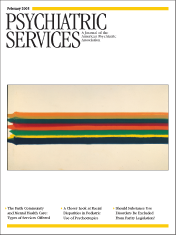Racism and Mental Disorders
In Reply: I thank Dr. Okoro for raising the other half of the question about racism in DSM-V. Submissions for Taking Issue have a word limit, and I was able to raise the question only from the side of the perpetrator and not the victim. However, before I discuss racism and victimization, I want to further address the possibility that racism can have psychological underpinnings, with which Dr. Okoro clearly disagrees.
First, when Dr. Okoro disagrees that racism should be looked at as a mental illness, he makes an error that many psychiatrists commit. Dr. Okoro's argument is reductionist and lumps a multidetermined, complex behavior into a single category of behavior. Thus he presumes that I am trying to make psychiatric excuses for the single behavior. As I stated in the editorial, racism "is mainly a product of learned behavior," and "a majority of explicitly racist persons do not have any psychopathology." Accordingly, I am not suggesting that racist behavior stemming from learned behavior be excused.
I find it interesting that even though I always take pains to express these qualifications when I am discussing this issue, many psychiatrists believe that I am seeking to excuse racism. Maybe we have so emotionally charged this issue that reason and science are left out of the discussion. If legitimate paranoid delusions fuel an individual's racist behavior, then I believe that a psychiatrist has a legitimate role in evaluating that person's dynamics for his or her racist behavior and classifying it by using psychiatric diagnoses. I have not come across any carefully done studies that have explored the propensity for paranoid patients to hold racist attitudes or engage in racist behaviors. However, I hypothesize that the proportion of racists who have psychopathologic dynamics is very small. Here I draw a parallel to perpetrators of violence—psychopathologic dynamics underlie the behaviors of only a very small proportion of such individuals. For a thorough discussion of this issue, I refer the reader to the DSM-V research agenda (1).
The second part of Dr. Okoro's letter proposes that DSM address the issue of victimization by racism. I could not agree more. I have suggested that the consequences of racial discrimination for African-American men be "grist for the mill" in psychotherapy (2). However, the psychiatric sequelae of being victimized by racism (3) are easily placed within the current DSM classification scheme. I know of clinical and forensic cases that list racism on axis IV under the category "Other psychosocial and environmental problems." Thus I disagree that we need a new DSM code for the mental anguish that victims of racism have suffered. However, considering the ubiquitous nature of racism in society, I would like to see racism specifically listed among the psychosocial and environmental problems under axis IV.
1. DJ Kupfer, MB First, DA Regier (eds): American Psychiatric Association Research Agenda for DSM-V. Washington, DC, American Psychiatric Publishing, 2002Google Scholar
2. Bell CC: The Sanity of Survival: Reflections on Community Mental Health and Wellness. Chicago, Third World Press, 2004Google Scholar
3. Klonoff EA, Landrine H, Ullman HB: Racial discrimination and psychiatric symptoms among blacks. Cultural Diversity and Ethnic Minority Psychology 5:329–339, 1999Crossref, Google Scholar



